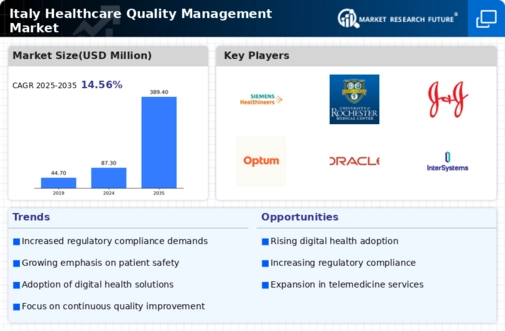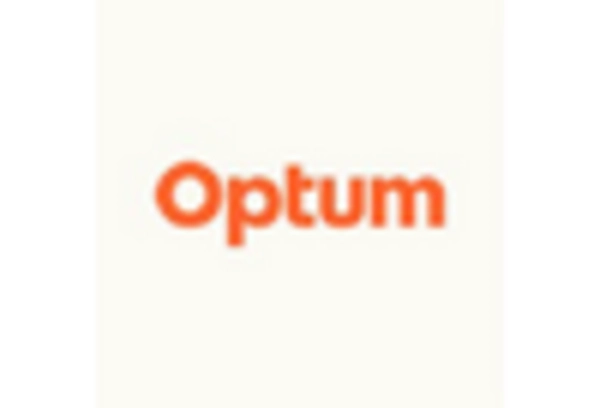Rising Demand for Quality Care
The increasing demand for high-quality healthcare services in Italy is a primary driver of the healthcare quality-management market. Patients are becoming more informed and are actively seeking providers that demonstrate superior quality metrics. This trend is reflected in the growing emphasis on patient satisfaction scores and clinical outcomes. According to recent data, approximately 75% of patients consider quality indicators when choosing healthcare providers. Consequently, healthcare organizations are compelled to adopt robust quality-management systems to meet these expectations. The healthcare quality-management market is thus experiencing a surge as institutions invest in technologies and processes that enhance care quality, ensuring compliance with both national and EU regulations.
Integration of Quality Standards
The integration of international quality standards into Italian healthcare practices is a crucial driver of the healthcare quality-management market. Organizations are increasingly adopting frameworks such as ISO 9001 and the EFQM Excellence Model to enhance their quality management systems. This integration not only helps in standardizing processes but also improves overall service delivery. Recent surveys indicate that about 50% of healthcare facilities in Italy have implemented these standards, leading to better patient outcomes and increased operational efficiency. As more institutions recognize the benefits of adhering to established quality standards, the healthcare quality-management market is expected to expand further.
Emphasis on Continuous Improvement
The emphasis on continuous improvement within healthcare organizations is a vital driver of the healthcare quality-management market. Italian healthcare providers are increasingly adopting methodologies such as Lean and Six Sigma to enhance their quality management processes. These approaches focus on eliminating waste and improving efficiency, which are essential for delivering high-quality care. Recent studies suggest that organizations implementing these methodologies have seen a reduction in operational costs by up to 20%. This commitment to continuous improvement not only enhances patient satisfaction but also positions healthcare providers competitively in the market, thereby fostering growth in the healthcare quality-management market.
Government Initiatives and Funding
Government initiatives aimed at improving healthcare quality in Italy significantly influence the healthcare quality-management market. The Italian government has allocated substantial funding to enhance healthcare infrastructure and quality standards. For instance, recent budgets indicate an increase of over €1 billion dedicated to quality improvement programs. These initiatives often include the implementation of quality-management frameworks that align with national health objectives. As a result, healthcare providers are incentivized to adopt quality-management practices that not only comply with regulations but also improve patient outcomes. This influx of government support is likely to propel the growth of the healthcare quality-management market in the coming years.
Focus on Data-Driven Decision Making
The shift towards data-driven decision making in healthcare is reshaping the landscape of the healthcare quality-management market. Italian healthcare providers are increasingly utilizing data analytics to monitor performance metrics and identify areas for improvement. This trend is supported by advancements in health information technology, which facilitate the collection and analysis of vast amounts of data. Approximately 60% of healthcare organizations in Italy are now employing data analytics tools to enhance their quality-management processes. By leveraging data, providers can make informed decisions that lead to improved patient care and operational efficiency, thereby driving the growth of the healthcare quality-management market.
















